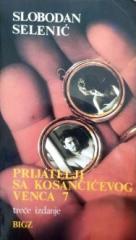Slobodan Selenić
Serbischer Schriftsteller und Dramatiker (Pakrac, 7. Juni 1933 – Belgrad, 27. Oktober 1995). Er schloss sein Studium an der Philosophischen Fakultät in Belgrad ab und lehrte dort ab 1965 Dramaturgie an der Fakultät für Schauspielkunst. In den Studien Engagement in the Dramatic Form (1965) und Dramatic Directions of the 20th Century (1971) beschäftigte er sich mit Fragen des Verhältnisses von Tradition und Innovation bei der Neudefinition des dramatischen Drehbuchs in den Werken von A. Artaud, B. Brecht, S. Craig, J.-P. Sartre, T. S. Eliot, A. Jarry, L. Pirandello, J. Cocteau, M. Krleža, J. Genet und S. Beckett. In seinen Romanen gestaltete er einen weit gefassten sozialgeschichtlichen Kontext als einen Raum der unausweichlichen gegenseitigen Vertrautheit zweier Kulturen, die in einem unlösbaren Konflikt vereint sind. Auf thematischer Ebene stellen Pera Bogaljas Memoiren (1968) die Gegenüberstellung der Traditionen des städtischen und ländlichen Serbiens nach der sozialistischen Revolution dar, und Pismo-glava (1982; geschrieben 1972) die Gegenüberstellung der ideologischen Matrizen des Kommunismus und der Staatsbürgerschaft in Serbien Zeit, während Premeditated Murder (1993) beide Themen des Bruchkomplexes der Beziehungen zwischen Serbien in den Jahren 1992 und 1944 thematisiert. Der Raum persönlicher und zivilisatorischer Identität wird regelmäßig durch den Austausch mit anderen konstituiert, sei es durch Kooperation oder durch Gewalt: Freunde (1980) stellt das gemeinsame kulturelle Erbe von Serben und Albanern, Fathers and Fathers (1985) von Serbien und England, Timor mortis (1989) von Serben aus Serbien und serbischen Vorfahren gegenüber. Der Roman Malajsko ludilo (2000) blieb unvollendet, in dem er die Ereignisse durch einen Wechsel der serbischen und muslimischen Perspektive darstellte. Außergewöhnliches sprachliches Bewusstsein und kompositorisches Können, die funktionale Integration der Faktographie in komplexe fiktive Strukturen und die souveräne Nutzung der erzählerischen Mittel des modernen Romans machen Selenićs romanhaftes Oeuvre zu einem der bedeutendsten in der serbischen Literatur des 20. Jahrhunderts. Er schrieb auch Theaterstücke (Kosančićev venac 7, eine Adaption seines eigenen Romans Friends; Ruženje naroda in zwei Teilen; Knez Pavle), die zusammen veröffentlicht wurden (Dramas, 2003).
Titles in our offer
Prijatelji sa Kosančićevog venca 7
Na stranicama ove knjige prepliću se tragično i komično, poetično i bizarno, melanholično i groteskno. Za ovaj roman Selenić je dobio NIN-ovu nagradu za 1980. godinu.
